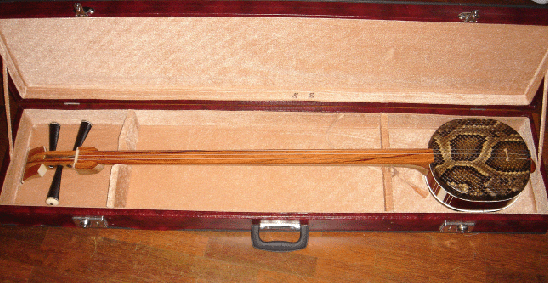The origin of the three-stringed piano
837 views · Organized by 南丘 on 2022-03-03
In the Qin Dynasty, it was called "Xian Tuo". Mao Qiling of the Qing Dynasty believed that the sanxian evolved from the Qin Dynasty musical instrument Xiantu. "Xihe Cihua": "Sanxian originated in the Qin Dynasty. It was originally a system of thirty drums and drums, but it was changed in shape and easy to sound. It was called drums and drums. During the Tang Dynasty, music people were often used to it, and the world thought it was Hu music.
The saying comes from the "Old Tang Book", but the "Old Tang Book" records that Xian Tuo is the predecessor of the pipa, which is different from Mao Qiling's statement.
Sanxian is also a traditional Manchu musical instrument. For example, it is recorded in the "Emperor Manchu Ceremony to Sacrifice God and Heaven" that Sanxian is used as one of the musical instruments to play Kagura. He Changlin, a scholar of the People's Republic of China, advocated that the sanxian was invented by the Manchus.
The saying comes from the "Old Tang Book", but the "Old Tang Book" records that Xian Tuo is the predecessor of the pipa, which is different from Mao Qiling's statement.

Sanxian is also a traditional Manchu musical instrument. For example, it is recorded in the "Emperor Manchu Ceremony to Sacrifice God and Heaven" that Sanxian is used as one of the musical instruments to play Kagura. He Changlin, a scholar of the People's Republic of China, advocated that the sanxian was invented by the Manchus.
Involving musical instruments
The sanxian has three strings in total, hence the name "Sanxian". Chinese traditional plucked instruments were also introduced to Ryukyu, Japan and other places. He plays the main instrument in operas such as Kunqu Opera, Huaihai Opera, Daxianzi Opera, etc.
Guess you like
Organized by 八日蝉 on 2022-06-15
"One after another, that mountain comes, one after another of water..." The northern Shaanxi folk song "Shandan Dan Blossoms Red and Bright" played by Yan'an Red Street Internet celebrity "Red Street Rabbit" and local folk singer Zhang Yongwang just opened, and it quickly became popular in the audience. There was a "sound wave" in the live broadcast room.
read >>
Organized by 赵锦辛 on 2022-05-07
Put on the drum stand, tune the three strings, the drums start, the three strings move... On the 5th, at the New Era Civilization Practice Station in Tayayi Village, Tayayi Township, Laiyuan County, Hebei Province, Jin You and Wang Shumin, two octogenarians The Xihe drum performance officially opened.
read >>
Organized by 一口泡芙 on 2022-04-11
Changshu is known as "the first book dock in the south of the Yangtze River". Once, there was an old saying in the Pingtan circle: storytellers walking on the dock in Changshu can stay for three consecutive years. This remark not only shows the large number of bookstores in Changshu, but also shows how enthusiastic people in Changshu are to listen to books. There is even a saying that "Pingtan artists do not pass through Changshu Wharf and are not considered to be loud stalls". All of these are enough to explain the prosperity of Changshu Pingtan market and the high level of audience appreciation.
read >>
Organized by 夏浩东 on 2022-04-11
Listening to books is the way of life of Suzhou people. When we talk about listening to books, we mean appreciating Suzhou Pingtan, which is the collective name of Suzhou Pinghua and Suzhou Tanci. Pingtan has a history of more than 200 years since the Qianlong period of the Qing Dynasty, and is known as "the most beautiful voice in China". Geographically, Pingtan does not have Jiaxing in the south, Changzhou in the west, Changshu in the north, and Songjiang in the east.
read >>
Organized by 弥光 on 2022-03-21
The sanxian, also known as the sanxian, is a plucked instrument. There is a special guqin in the old site of the Liuping branch in Wushan of the Communist Party of China. During the Long March, local party organizations used it to send signals to the outside world to cover the safe passage of the Red Army through Wushan.
read >>
 渝公网安备 50010702504639号
渝公网安备 50010702504639号